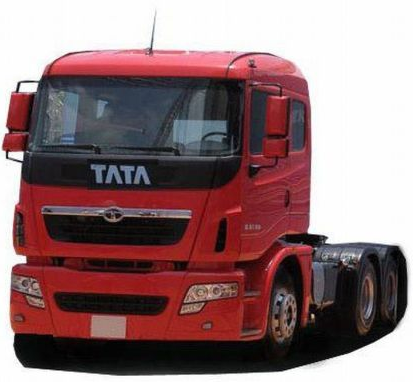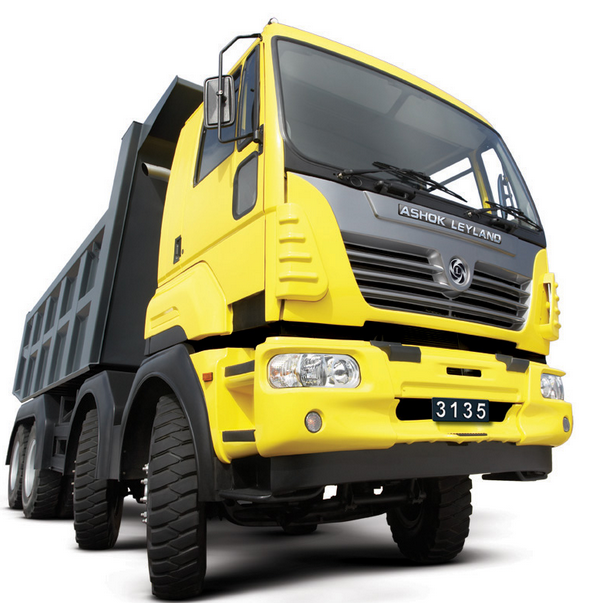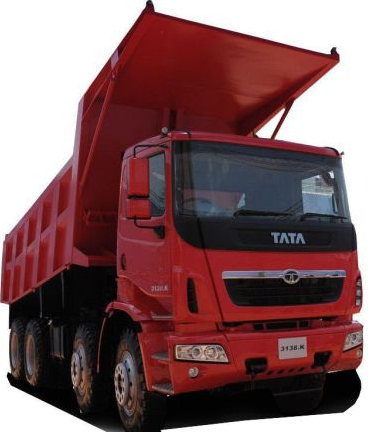Truck makers employ multi-layered strategy to increase sales
 Courtesy of Live Mint and The Wall Street Journal, by Shally Seth Mohile and contributor, P. Manoj: India’s two biggest truck and bus makers, Tata Motors Ltdand Ashok Leyland Ltd, are employing a multi-layered strategy to increase sales in a sluggish market while working towards tackling competition from new entrants such as Daimler AG of Germany andBeiqi Foton Motor Co. Ltd of China.
Courtesy of Live Mint and The Wall Street Journal, by Shally Seth Mohile and contributor, P. Manoj: India’s two biggest truck and bus makers, Tata Motors Ltdand Ashok Leyland Ltd, are employing a multi-layered strategy to increase sales in a sluggish market while working towards tackling competition from new entrants such as Daimler AG of Germany andBeiqi Foton Motor Co. Ltd of China.
They are launching models that are more fuel-efficient with a better power-to-weight ratio besides offering corporate discounts and extended warranties to attract customers in an approach that combines technology tweaks and monetary incentives.
Truck sales have been hit badly by the slowing economic growth, which is forecast to slump to a decade’s low of 5% in the current fiscal year.
Sales of medium- and heavy-duty trucks fell by a fourth to 180,565 units in the 10 months to January from 237,824 units a year ago, according to the Society of Indian Automobile Manufacturers (Siam).
Competition in the shrinking market is set to increase, threatening to cut the market share of Tata Motors and Ashok Leyland. Daimlerlaunched its BharatBenz brand of trucks last October. Foton is building its plant in Chakan near Pune and is expected to start production in December.
Tata Motors, which sells one out of every two trucks bought in the country, last month started a four-year extended warranty on its entire range of heavy trucks of 25 tonnes and higher GVW, or gross vehicle weight. For the past six months, it has been transporting heavy-duty trucks and buses to their destinations on specially designed trailers, without truckers having to drive them for long distances.
“Unlike the ones that are driven for thousands of miles before reaching the destination, these vehicles do not require the ‘touch up’ or another round of inspection,” said Ravi Pisharody, executive director of the commercial vehicle business unit at Tata Motors.
 Its Tamil Nadu-based rival, Ashok Leyland is in the process of setting up a network of workshops that can do sheet metal cabin repair jobs for trucks and reduce the costs incurred in replacing a cabin by 20%, according to Rajive Saharia, executive director of marketing at Ashok Leyland. “Cabin repair is a big problem. It’s one of the reasons why truck buyers do not prefer a factory-built cabin,” he said.At a cost of Rs.25 lakh each, as many as 26-28 such centres across the country would be opened in three-six months, Saharia said.
Its Tamil Nadu-based rival, Ashok Leyland is in the process of setting up a network of workshops that can do sheet metal cabin repair jobs for trucks and reduce the costs incurred in replacing a cabin by 20%, according to Rajive Saharia, executive director of marketing at Ashok Leyland. “Cabin repair is a big problem. It’s one of the reasons why truck buyers do not prefer a factory-built cabin,” he said.At a cost of Rs.25 lakh each, as many as 26-28 such centres across the country would be opened in three-six months, Saharia said.
Amit Kaushik, sales forecast manager for medium and heavy commercial vehicles at business information provider IHS Inc., said customers are not only looking at the initial acquisition cost but at the total cost of ownership also. “This is making the incumbents put in additional investments to match the needs.”
For instance, for every such vehicle transported on a trailer, Tata Motors incurs an incremental cost ofRs.15,000-30,000, depending on the vehicle and the distance. But Pisharody said the volume and scale of the order justified the additional cost. Currently, there are 4,700 such custom-built trailers on the road. He hopes to add 700 by the end of March.
“Some companies have started to rejig their service offerings to customers by providing comprehensive warranty and fleet maintenance programme,” said Vineet Agarwal, joint managing director of Transport Corp. of India Ltd (TCI).
Not all truckers, though, are impressed. “All of it is only on paper, nothing has changed,” said S.P. Singh, head of policy and planning at Choudhary Transport Co. Ltd, which has 450 trucks and 30 buses in its fleet. Singh’s company recently bought four trucks from Ashok Leyland in Hyderabad. He claimed that it took the dealer four-five days to conduct pre-delivery inspection when it should have been completed in a day.
 “With sales of heavy duty trucks having collapsed by a half, all they (manufacturers) are interested in is sales. We have reconciled to the fact that nothing is going to change with regard to the quality of service,” said Singh. “They (Tata Motors and Ashok Leyland) have yet to wake up to competition,” said Inderbeer Singh, a Delhi-based transporter. N.L. Gupta, Navi-Mumbai based proprietor of Caravan Roadways Ltd concurred with the view.
“With sales of heavy duty trucks having collapsed by a half, all they (manufacturers) are interested in is sales. We have reconciled to the fact that nothing is going to change with regard to the quality of service,” said Singh. “They (Tata Motors and Ashok Leyland) have yet to wake up to competition,” said Inderbeer Singh, a Delhi-based transporter. N.L. Gupta, Navi-Mumbai based proprietor of Caravan Roadways Ltd concurred with the view.
Customers in the branded transport sector with fleet sizes of 1,000 trucks or more have a different story to tell.
“Over the last couple of years, Ashok Leyland definitely has put in greater effort than rivals to improve services,” said a senior official at a logistics firm, requesting anonymity as his firm has an ongoing business relationship with most of the truck makers.
Only big organized fleet operators or firms get the best of services while those with small fleets are ignored even as the unorganized small truck operators comprise 85-90% of the transport sector in India, said V.G. Ramakrishnan, vice-president of market research firm Frost and Sullivan. “Big fleet operators can fend for themselves. It is those at the bottom of the pyramid who have diversified needs,” he said. Ramakrishnan said there would be more disruptions in the market and the dynamics will change once the newer firms such as Foton drive into the market.
Category: General Update










